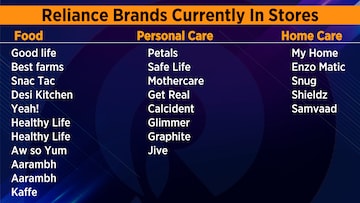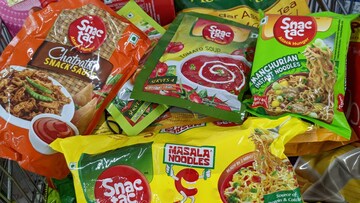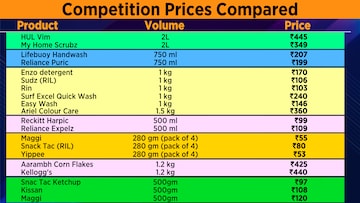The $214 billion Reliance Industries (by market cap)– which has a presence in everything from telecom (Reliance Jio) to retail, petrochemicals to oil and gas, entertainment and financial services– will soon foray into a fast-moving consumer goods (FMCG) business, a $100 billion market already dominated by the likes of Hindustan Unilever, ITC and Britannia among others.
Mukesh Ambani, one of the world’s richest men with a net worth of $91.1 billion as of Sept 2, wants to have his own brands of everything from soaps and shampoos, sugar and spice, and everything in between. “The
objective of this business is to develop and deliver high quality, affordable products, which solve every Indian's daily needs,” Isha Ambani said at RIL’s 45th annual general meeting (AGM).
Ambani’s daughter
Isha will lead the conglomerate's retail business. Meanwhile, former Coca-Cola head honcho T Krishnakumar, who joined Reliance in 2021, shall lead the new FMCG segment, multiple sources, who requested anonymity, have confirmed.
The Reliance Group may start small but eventually, it will lock horns with well-entrenched giants in the space who have spent decades and millions in money, to have established brands, distribution channels, and customer bases.
However, Mukesh Ambani has already shown that he can disrupt like no one else in the telecom space, as a fresh entrant taking on the likes of Airtel and Vodafone Idea that had been around for decades. Today, Reliance Jio has the fastest-growing subscriber base.
As of June 2022, Jio had a 36 percent market share while Airtel and Vodafone Idea's shares stood at 31.63 percent and 22.37 percent, respectively, according to Telecom Regulatory Authority of India's (TRAI) data.
Reliance Retail retail will face challenges but not too many
While Reliance already has a relatively smaller range of FMCG products in the market, most of its brands are being sold only through its own store network while it is selling products of other brands like HUL through its B2B platform, which sends its products to kirana stores. Some of these may need to be upgraded with better packaging and communication.
Research firm Edelweiss opines that the track record of RIL in B2C has been mixed. It hasn’t been doing that well in jewellery, footwear, etc as against the initial expectations of the market. Existing players like Titan, Metro and Bata continue to co-exist and do well in spite of years of RIL’s presence and decent aggression in ads.
It also believes getting shelf space in kiranas is very tough for new players because several other retailers have tried and failed. “FMCG is a daily treadmill with the need for continuous Innovations, direct reach, robust feet on the ground, analytics, etc unlike say a wireless telecom business. Most of the FMCG players are present across the price value equation, so white spaces are limited while existing players have decades of loyalty with consumers and relationship with distributors,” it said.
According to brand strategy consultant Harish Bijoor, Reliance has been very B2B through its supermarket dealers in brands and private labels. “Private labels going public is a big move. Private label competence is back-end and public label is front-end,” he explained and said, companies like Colgate and Reckitt have honed this competence over decades.
“Simply put,
Reliance needs to cobble together the ability to front-end brand positioning and that will take a decade to put together. As it focuses on shopping rather than shop, that competence will also be built,” he told CNBC-TV18.
Reliance Retail may choose to build a brand portfolio through a combination of its own brands, joint ventures, and acquisitions under the 'Reliance Retail Consumer Brands' umbrella.
In the first phase, the conglomerate is likely to work with several strong heritage brands in the FMCG domain, including staples, food and beverages, home and personal care and beauty categories. The company will help contemporise the brands and scale their business across India, and globally.
Reliance may partner with brands to either become the owner or enter into a joint venture. It may also decide to buy existing brands to build its business. There may be an opportunity for regional brands to tie up with Reliance to expand their addressable market beyond their existing boundaries and take them national.
Reliance already has the JioMart B2B platform, from where smaller mom-and-pop store owners buy their inventory. The real success for Isha Ambani will be to have Reliance’s brands and products on the shelves of a much wider pool of smaller, neighbourhood stores.
Arvind Singhal, CMD of management consulting services firm Technopak Advisors is of the view that India will see new consumers coming into the picture and look for branded products.” They will not use private labels, it (RIL) will be another choice available at a store and if satisfied, they'll buy it,” he said.
Therefore, he doesn't see too big a challenge for Reliance, given how the market will evolve over the next decade.
What RIL needs to do to stave off competition
According to global brokerage Morgan Stanely, for Reliance, the entry into the FMCG space makes sense. After all, the brokerage said, it offers gross margins of 40-60 percent -- higher than the 15 percent or thereabouts in the retail space and that would help realise Mukesh Ambani's vision of making Reliance more robust, resilient, purpose-driven, and truly future-ready so that it more than doubles its value by the end of its golden decade in 2027.
Technopak Advisors’ Singhal pointed out that the bulk of India still has very low purchasing power. “They have aspirations to have carbonated beverage and would have heard of Coke and PepsiCo and have a brand recall. Tomorrow, if they have a Campa Cola which is promoted and a value price differential that is significant to make a switch, they can make the switch easily. There is a brand recall but if Reliance comes in with value proposition - a good or better price - don't see a challenge in some customers making a switch,” he said.
Meanwhile,
Adani Wilmar CEO Angshu Malik doesn’t think a single player like it can change the consumption of loose to packed. There's a requirement of at least two to three big players. “The staples business is very large in terms of volumes. There is enough scope for all of us to grow. We don't have to snatch each other's share,” he said.
Singhal too RIL’s entry may only have a marginal impact on rival firm FMCG firms as total spending on merchandise in India right now is $800 million and might increase to $ 1.8 billion across all categories of consumer spending. FMCG will double in the next 10 years as far as market opportunity is concerned and there’s room for enough players to grow, he said.
Research firm Edelweiss also doesn’t expect a big impact on the numbers of existing players from a two to three years perspective but it said it is still very early to pencil an impact and one must wait to see when the launches happen.
It expects RIL to initially target the more commoditised parts of FMCG like pulses and grains, edible oils, flour, dry fruits, spices, pickles, pastes, idli dosa batter, namkeens, sweets, lower-end detergents, etc. “We expect RIL to also target the 20-30 percent unorganised/regional brands in most of the segments,” it said.
Edelweiss added that RIL will aim to piggy ride its improving distribution, cash and carry infra and sourcing abilities.
Since the AGM on Aug 29, RIL’s shares have declined 2.5 percent but so far this year the stock has increased investors’ wealth by over 5 percent as against the benchmark Sensex which has fallen 0.6 percent during the period.








